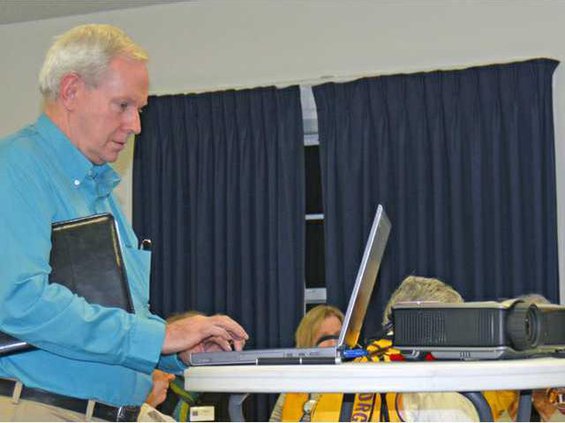Joe Hoke, representative of the U.S. Army Corps of Engineers on the Savannah Harbor deepening project, addressed the Richmond Hill Lions Club during its Jan. 30 meeting at the John W. Stevens Wetlands Education Center.
Hoke presented a slideshow on the importance of the port and its impact on the economic and environment of Savannah, the state and the nation. Congress first authorized deepening of the Savannah River channel in 1999 at a cost of $459 million, but with the projected cost increases now is $652 million. Congress will have to reauthorize the project with higher spending limits.
When the Corps of Engineers analyzes a project, it looks at the nationwide benefit of the project. The Garden City Terminal is the fourth-largest container port in the United States, the second-largest container port on the East Coast, the largest single terminal in North America and fastest-growing container port in the nation since 2001.
Statewide, Georgia's deep-water ports will create 352,146 full- and part-time jobs, $66.9 billion in sales, $32.4 billion in gross state product, $18.5 billion in income and $2.5 billion in state and local taxes.
The port’s competitive advantages are that it is served by two competing railroads — the Norfolk Southern and CSA — easy access to interstates 95 and 16, room to expand the landside container-handling area, and the landside container handling areas are continuous and more efficient. The marketing area for the port covers about 44 percent of the U.S. population.
The Panama Canal is in the process of deepening from 42 feet to 60 feet and is the key to the deepening of East Coast ports to accommodate larger container ships. Most ports around the world now are 48 to 52 feet. With the deepening, the Savannah port will be going from 42 feet to 47 feet.
Hoke explained the environmental impact of channel deepening. Salt water is heavier than fresh water, and when the incoming tide creates a wedge as it moves up river, the deeper channel lets the wedge move further upstream and allows more salt to move upstream. This increases salinity and results in lower dissolved oxygen. The combination of dissolved oxygen and salinity leads to fish-habitat changes, as well as changes in the plant community.
Savannah has a 8- to 9-foot tidal range, which is larger than other ports. The berths have been deepened and larger ships can ride the tide into port using the higher tides.
The proposal for deepening the channel is to maintain the same side slope, with the new channel bottom slightly narrower, so that additional property doesn't have to be acquired and impact the existing shoreline. With wider ships and narrower bottoms, passing lanes have to be added in certain areas.
In other club business, new member Dewaine Priester was inducted into the Richmond Hill Lions Club and received his Lions Club pin. A membership patch was received from LCI for the club banner and a crystal pin was awarded to Past President Ronny Gerrald for having excellent membership retention in the year of 2012-13. Chevron awards were presented to Fred Thomasson for 15 years’ service and to Ronny Gerrald for 35 years’ service. Ouieda Sisco was presented the Membership Key Award for introducing two members who remained in the club for at least one year.
The club is a nonprofit service organization. For more information, write to PO Box 798, Richmond Hill, GA 31324.
Lions Club hears about harbor project


Sign up for our E-Newsletters